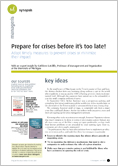Predictable Surprises

According to the authors, many crises that take observers by surprise are in fact the result of a logical sequence of events and could have been prevented had appropriate measures been taken in time.
Author(s): Max H. Bazerman, Michael D. Watkins
Publisher: Harvard Business School Press
Date of publication: 2004
Manageris opinion
Many crises that take observers by surprise are in fact the result of a logical sequence of events and could have been prevented had appropriate measures been taken in time. This is the thesis of the authors, illustrated primarily by two events that shook the United States in recent years, and which are studied in part one, namely, the September 11, 2001 terrorist attacks and the Enron scandal. These two earthshaking events may well be the precursors of many others. Chapter 10 concludes the book by listing a number of potential catastrophes that are likely to darken the future in the coming years, e.g. global warning, over-fishing, etc.
Bazerman and Watkins focus on the facts. Their book is first and foremost a collection of very detailed stories which read almost like a novel, and which are fascinating, not only for executives interested in crisis management, but for anyone interested in contemporary history.
The second area of focus of the book is a study of defensive mechanisms and behavioral biases that drive people and organizations to resist facing crisis situations. Chapters 4 and 5, illustrated by the Pearl Harbor examples and the U.S. intervention in Somalia, are must-reads in this regard.
Brilliant in its analysis, this book is less original in the advice it proffers. Readers are nonetheless advised to peruse chapter 8, devoted to the identification of top-priority risks.
